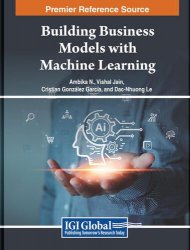 Название: Artificial Intelligence Ethics and the Future of Warfare: Global Perspectives
Название: Artificial Intelligence Ethics and the Future of Warfare: Global PerspectivesАвтор: Kaushik Roy
Издательство: Routledge
Год: 2024
Страниц: 299
Язык: английский
Формат: pdf (true)
Размер: 18.4 MB
This volume examines how the adoption of Artificial Intelligence (AI) technologies is likely to impact strategic and operational planning, and the possible future tactical scenarios for conventional, unconventional, cyber, space and nuclear force structures. In addition to developments in the USA, Britain, Russia and China, the volume also explores how different Asian and European countries are actively integrating AI into their military readiness. It studies the effect of AI and related technologies in training regimens and command structures. The book also covers the ethical and legal aspects of AI augmented warfare.
The rise of AI is part of the ‘Information Revolution.’ Information is a crucial integer of material productivity in the era of Information Revolution. In this era, the generation of new knowledge is dependent on computing power. Basic services like banking, railways, air transportation, water and energy distribution are becoming more and more dependent on information and communication technologies (ICT). The principal sources of energy include digital information, computer software and computerised communications. The computer with its electronic brain is supplementing (might supplant in the distant future) human thinking. The integrated circuits and computer technology are the lifeblood of AI, and these two technologies are continuously developing. However, AI is a combination of technologies which includes both hardware and software. So, an AI system includes hardware like mainframe computers, microchips, sensors integrated with software as programs, algorithms, etc. The fundamental building blocks of AI are learning algorithms which allow the machine to detect patterns in data, make decisions, adjust their behaviour in relation to the environment. This learning process is called Machine Learning (ML) and its subset is Deep Learning (DL). We will discuss these two terms later in detail. The production of computers with increasing processing powers, the internet, Internet of Things (IoT), iCloud, Facebook, X (formerly known as Twitter), advances in robotics, synthetic biology, neuroscience and nanotechnology are making possible the use of AI in the non-military and military sectors. So, AI can be simplistically grouped as a symbiosis of related technologies centring around ICT. The result is that weapons are being informationised and intellectualised.
Chapter 1 shows that AI-related technologies if applied in the case of defence wholesale, have the potential to revolutionise warfare by changing not only the character but also the nature of warfare. If war is dehumanised both at the level of waging it (by intelligent machines instead of humans) and also as regards decision-making, then truly we are on a threshold.
Chapter 2 provides an overview of the possible use of AI-related technologies in the various branches of the military. For him, at the strategic level, the effect of AI is ambiguous. Author argues that, at present, the effects of AI at the tactical and operational levels are massive and amount to an RMA. Author asserts that AI, being a disruptive technology, and its widespread applications, which are inevitable in the near future, will transform the logistics, doctrine, training, command and tactical concepts of combat.
In Chapter 3, author focuses on a particular piece of military system: Aviation. He details the various ways in which AI-embedded sixth-generation aircraft is paving the way for the emergence of pilotless aircraft. Have human pilots reached a dead end? There are several advantages to using automated aircraft compared to a manned one. Unlike a human pilot, the AI flying the aircraft will not get tired and will be able to make a steeper and faster turn and would be able to fly longer and higher.
The volume will be of great interest to scholars, students and researchers of military and strategic studies, defence studies, Artificial Intelligence and ethics.
Contents:
Скачать Artificial Intelligence Ethics and the Future of Warfare: Global Perspectives
[related-news] [/related-news]
Комментарии 0
Комментариев пока нет. Стань первым!
















